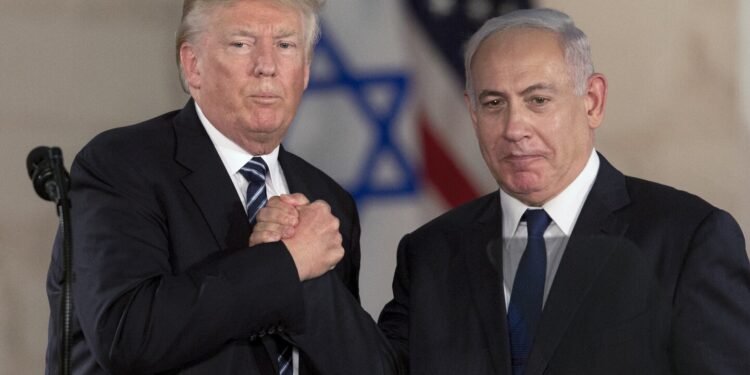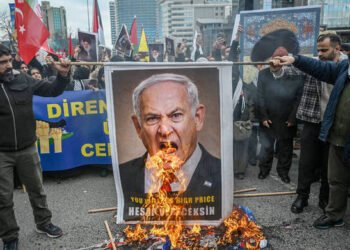TEL AVIV, Israel (news agencies) — Donald Trump will return to the U.S. presidency at a time of unprecedented conflict and uncertainty in the Middle East. He has vowed to fix it.
But Trump’s history of strong support for Israel coupled with his insistence during the campaign that the war in Gaza should end quickly, the isolationist forces in the Republican party and his penchant for unpredictability raise a mountain of questions over how his second presidency will affect the region at this pivotal moment.
Barring the achievement of elusive cease-fires before the inauguration, Trump will ascend to the highest office in the country as a brutal war in Gaza still rages and Israel presses its offensive against the Lebanese Hezbollah militant group. A conflagration between Iran and Israel shows no signs of abating — nor do Israel’s conflicts with Iranian proxies in Iraq and Yemen — and Iran’s nuclear program remains a top concern for Israel.
Throughout his campaign, Trump has vowed to bring peace to the region.
“Get it over with and let’s get back to peace and stop killing people,” Trump said of the conflict in Gaza in an interview with conservative radio host Hugh Hewitt in April.
Israel launched the war in response to Hamas’ Oct. 7, 2023, attacks, when militants killed 1,200 people in Israel and kidnapped 250, with dozens still in Gaza. Israel’s offensive has killed more than 43,000 people, according to Gaza health officials, whose count does not distinguish between civilians and fighters, though they say more than half of the dead are women and children.
The war has ignited a humanitarian catastrophe in Gaza, driven Israel into increasing international isolation, with two world courts examining charges of war crimes, and has sparked a wave of protests on American campuses that have fueled debate over the U.S. role as Israel’s key military and diplomatic supporter.
International mediators from the U.S., Egypt and Qatar have tried unsuccessfully to bring about a lasting cease-fire.
Yet Trump has repeatedly urged to Israel “finish the job” and destroy Hamas — but hasn’t said how.
“Does finish the job mean you have a free hand to act in dealing with the remnants of Hamas? Or does finish the job mean the war has to come to an end now?” asked David Makovsky, director of the program on Arab-Israel Relations at the Washington Institute for Near East Policy. “That’s part of the enigmas here.”
Uncertainty also shrouds how Trump will engage with Israeli Prime Minister Benjamin Netanyahu. During his first term, Trump offered broad support for the Israeli leader’s hard-line policies, including unilaterally withdrawing from a deal meant to rein in Iran’s nuclear program that Netanyahu long opposed.
Trump also recognized Jerusalem as Israel’s capital, bolstering its claim over the disputed city, and Israel’s annexation of the Golan Heights, captured from Syria in the 1967 Mideast war. He presented a peace plan with the Palestinians widely seen as favoring Israel. Settlement-building in the Israeli-occupied West Bank, seen as an obstacle to Palestinian statehood, surged under his presidency.
Trump also helped secure agreements between Israel and four Arab countries to normalize ties that were not contingent on progress toward Palestinian statehood — a major victory for Netanyahu. The Israeli leader hopes to replicate those successes with a deal with Saudi Arabia.
The leaders had a falling out after Netanyahu congratulated President Joe Biden following the 2020 elections — a move Trump viewed as a slight from his loyal ally, though Netanyahu visited Trump in Florida this year.
Under Biden, the U.S. has been critical at times and slowed some weapons deliveries in response to Israel’s conduct in Gaza. Netanyahu is likely hoping that Trump’s return will loosen any restraints on Israel to pursue its war goals. The American leader could also work to challenge a potential international war crimes arrest warrant for Netanyahu. And a smoother relationship with Washington could help improve the Israeli leader’s own popular support.
“He has the most pro-Israel record of any president,” said Michael Oren, a former Israeli ambassador to Washington. “The hope is here that there’ll be more of the same.”
Netanyahu leads a far-right government whose key members have vowed to topple his rule if the war in Gaza ends with anything short of Hamas’ destruction. They support resettling Gaza and are enthusiastic about a Trump presidency — and their influence will only grow now that Netanyahu has fired his defense minister over his more pragmatic approach to the conflict.
Their grip on the government and over Netanyahu’s political future helps explain why Netanyahu has not spelled out a clear vision for a postwar Gaza.
The Biden administration has favored having the war-ravaged territory governed by the Western-backed Palestinian Authority, which administers parts of the West Bank. Netanyahu has rejected that idea and insists on the right for the Israeli military to operate there.
Trump has not outlined a clear vision, although he has said developers could make Gaza “better than Monaco” because it has “the best location in the Middle East, the best water, the best everything.”









 United Arab Emirates Dirham Exchange Rate
United Arab Emirates Dirham Exchange Rate

